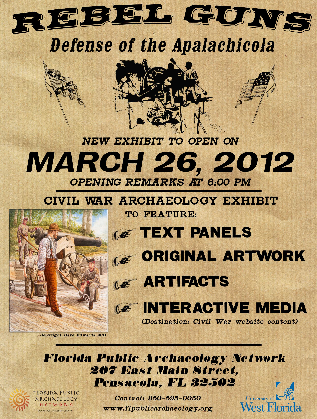 The Florida Public Archaeology Network (FPAN) will have an opening reception for a new exhibit called “Rebel Guns: Defense of the Apalachicola†on Monday, March 26 at 6 p.m.
The Florida Public Archaeology Network (FPAN) will have an opening reception for a new exhibit called “Rebel Guns: Defense of the Apalachicola†on Monday, March 26 at 6 p.m.
The exhibit is a result of a 2010 excavation in which at team of archaeologists from UWF and FPAN removed layers of earth from Florida’s Torreya State Park along the banks of the Apalachicola River. The team uncovered a part of history from the American Civil War.
“This site was important because its main purpose was to prevent Union gunboats from heading upriver to the manufacturing heart of the Confederacy in Columbus, Ga.,†said Mike Thomin, manager at DARC. “I think what might surprise some people is that this Confederate Battery was actually built by enslaved African American laborers who were impressed by order of Florida governor to build the fortifications. Many of them were provided by Governor John Milton himself.â€
Florida isn’t generally thought of when it comes to Civil War history. For those that check out the exhibit might be surprised to find that the state did have an impact.
“Florida had a very important role to play during this conflict and there are many Civil War archaeological sites across our states landscape both on land and underwater,†Thomin said. “People tend to view Florida has not having a significant role in this conflict, but this really was not the case at all and there are Civil War heritage sites all across the state.â€
UWF archeologists uncovered several artifacts at the site including: small munitions, fragments of tools used to build the battery, iron nails used for construction and several friction primers – some Thomin said were possibly British manufactured. Some uncovered items were still in good condition.
“A whole section of the support timbers used for the floor of the gun emplacement were in excellent condition – we have a small piece of it on display in our stairwell – and a section of the magazine was still intact after almost 150 years,†Thomin said. “Several of the artifacts found will be on display, as well as some artifacts that reflect Pensacola’s role in the war.â€
The exhibit will be featured in the Destination Archaeology Resource Center (DARC) located at 207 E. Main St. Dr. William Lees, Dave Edwards, who created the artwork for the exhibit, and Brian Mabelitini, who wrote his master’s thesis about the archaeological site, will deliver a few opening words. For more information, please visit flpublicarchaeology.org/darc.php



